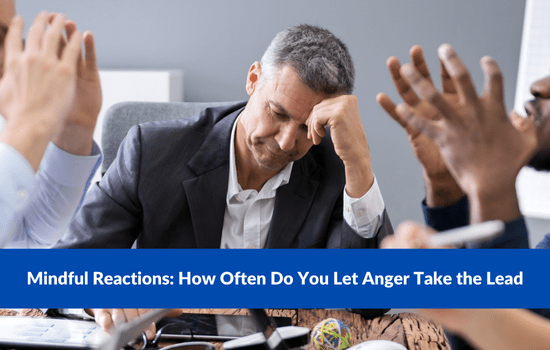Understanding our emotions is crucial, as they serve a purpose in sending us vital messages. Through emotional intelligence and self-management, it’s critical to strategically manage feelings like anger, treating it as a valid and useful emotion. With strategic timing, we can better navigate and respond to situations without letting anger take the lead.
The Unplanned Emotion: How Often Do You Choose Anger?
As Aristotle said, “Anybody can become angry – that is easy, but to be angry with the right person and to the right degree and at the right time and for the right purpose, and in the right way – that is not within everybody's power and is not easy.”
Anger: A Genuine and Essential Emotion

Anger is a natural and necessary emotion that shouldn't be suppressed but managed thoughtfully. It can reinforce the seriousness of a situation and act as a great motivator. Sometimes, expressing anger is the only way to communicate intense feelings and provoke action, especially in stressful situations.
However, the key to building emotional intelligence lies in recognizing, understanding, and effectively channelling those feelings. Anger can be productive when expressed correctly but can also be destructive when left unchecked.
Timing Is Everything
Many believe that good timing is a matter of fate, luck, or even grace. Timing affects almost everything we do in life, including how we express emotions like anger. Developing an awareness of the right time and place to show anger is vital to managing challenging situations successfully.
Take sports, for example - a coach calling a timeout at just the right moment can re-energize a team and refocus them on victory. Their strategic use of anger can motivate and improve team performance. The same principle applies to everyday life. Learning to recognize your emotional triggers and manage them effectively can change the outcome of difficult situations.
Be Strategic: Use Anger Purposefully
During my workshops, I often get curious looks when I suggest that anger can be a helpful emotion when used purposefully. Managing anger goes beyond just controlling your temper - it’s about knowing how and when to use it to convey a clear message.
Overusing anger can dilute its impact. If anger becomes your go-to reaction for every situation, it may eventually lose its power to motivate or create change. Over time, people may become desensitized to it, making your expressions of anger ineffective.
Raising your voice or expressing anger should be reserved for moments when it’s necessary. If you constantly raise your voice in frustration, your message becomes inconsistent. But when used sparingly and strategically, anger can emphasize the seriousness of the moment.
A Practical Approach to Anger Management
The next time you feel anger rising, take a moment to be strategic in your response. Ensure that your anger serves a purpose and is channelled toward a productive outcome. The key is to make sure your message is heard without diminishing its importance by overuse.
The next time you feel angry, ensure you are strategic with your approach! My book, The Power of Emotion, is a practical tool for developing emotional intelligence by helping you understand and manage your emotions for the greater good. Be sure to explore more motivational blogs here for further insight into emotional intelligence and self-management techniques.
This article was originally published on December 30, 2017, and has been updated (October 2024).
More Motivational Reads Here »
How Emotionally Intelligent Are You?
Sign up for monthly tips to build your Emotional Intelligence and reduce Emotional Hijacking!

















